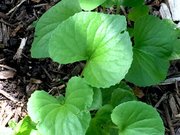Q For years, I've carried in my pocket a buckeye seed that was given to me by a friend. It is "dying" of old age, and I'd like to replace it. I have a native buckeye tree in my yard that blossomed beautifully this spring, and now it has unripe seeds. I am afraid if I leave them to ripen and fall off the tree the squirrels will get them, as they have in the past. Can I cut them now and let them dry in a place in the house?
A Let them fully ripen, and when the pod opens to expose the shiny seeds, then harvest one to carry around. If the seed is underripe, it will deteriorate quickly. Ripe seeds should last for years in your pocket.
Q The attached pictures are some kind of "weed" that is taking over our beds. What is this and how do we get rid of it?
A The weed in question is a wild violet. They are tenacious, to say the least, and getting rid of them is difficult if not impossible. They have a small bulb or corm underground and spread quickly. While some gardeners like them for their showy spring blooms -- and they are a host for our state butterfly, the Diana fritillary -- I detest them. Spot-spraying with a product containing glyphosate (Roundup) can help. I cut them to the ground using a string trimmer and then lay cardboard and mulch over them, and they are "gone" for the season. But they come back strong the next year.
Q Are there any restrictions on planting bamboo in your yard?
A Unfortunately, there are no restrictions, but there should be. If you plant running bamboo, it will take over and keep running. There are clumping bamboos that would not be as invasive.
Q We have a relatively old persimmon tree in the backyard. It is not doing too well ... a lot of dead limbs and thin foliage this year, and it is already dropping persimmons. We are blaming the very wet spring. What can we do to help this nice tree survive and thrive? I'm pretty sure you'll say to remove the dead limbs, at least. Should we put down some kind of fertilizer?
A Trees typically don't die overnight unless they are struck by lightning. Instead, their deaths can be a slow process, getting thinner and thinner each year and leafing out less and less. From the pictures I saw, your tree's decline is not something that started just this spring. The tree has fewer branches than it should, and the die-back on the tips is not a good sign. When a tree starts to decline, there is usually not a great deal you can do to reverse the damage. Water is vital for tree health, so keeping it well watered can help. From the lush green lawn around it, I would say it has ample nutrition. I don't think the tree is in a position to fall over, but dead limbs can drop. Removing the dead tips, I think, would be a Band-Aid approach.
Q I just returned home from three weeks of vacation and found that the leaves of my cowpeas are covered with a black powder that doesn't brush off. I've attached a picture. Can/should I do something about it? The plants have just begun flowering.
A You have (or had) a nice crop of aphids. These tiny insects suck the sap out of the plants and give off sticky honeydew. Wherever the honeydew resides, a black sooty mold will form. Kill the aphids, and you take care of the problem. The recent heavy rains and wind may have solved the problem, since aphids are poor swimmers. If not, insecticidal soap should do the trick.
Janet B. Carson is a horticulture specialist for the University of Arkansas Cooperative Extension Service. Write to her at 2301 S. University Ave., Little Rock, Ark. 72204 or email her at
jcarson@arkansasonline.com
HomeStyle on 08/06/2016

